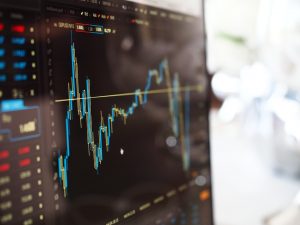 In the world of modern financial trading, getting there first is everything. This is true across all forms of trading, but it is the defining feature of the increasingly important activity known as high-frequency trading (HFT).
In the world of modern financial trading, getting there first is everything. This is true across all forms of trading, but it is the defining feature of the increasingly important activity known as high-frequency trading (HFT).
This relies on computer algorithms that can make trades much faster than any human being could possibly achieve. Indeed, high-frequency traders hit the news some years ago when it was revealed that they were able to see when someone was buying a stock, move in and buy it first, and then put it up for sale at a higher price – all in the nanoseconds between an ordinary trader clicking “buy” and the order actually being received.
Fractions of a second
High-frequency traders are able to achieve these results, where advantages are literally measured in imperceptible fractions of a second, in several ways. One is to be physically located as close as possible to the computers that match trades on the financial exchange in question. Although to the layperson, digital communication around the globe is as good as instant, in fact, information still reaches nearer points imperceptibly faster than those points that are further away.
To high-frequency traders, this art of proximity is known as co-location. It gives them (or more to the point, their computer programs) crucial access to market information milliseconds before those at a greater distance. This fraction of time is enough for their algorithms to act decisively.
In a similar fashion, having the most direct fibre-optic cable between an exchange and a trader’s computer can also speed up the transfer of information enough to make it vitally important. The straightest cable will cover the shortest distance between two points, so high-frequency traders have been known to pay for cables to be laid straight through mountains if it will get them that advantage.
Dark pools
High-frequency traders also make use of dark pools. These are private exchanges where traders can deal anonymously. Dark pools are not accessible to the public, and are often used to facilitate large-scale block trading without it impacting the market overall. However, within these dark pools, information leakage can take place. On any market, information is the most valuable commodity of all, and shrewd or unscrupulous traders can make great gains based on these momentary leaks.
Staying ahead
Being ahead of the game is also just as important for the ordinary trader, however. In the world of day trading or short-term trading, the rapidly shifting positions of stocks, shares, bonds and currencies can be played to the advantage of the trader with their finger on the pulse and an instinct for which way the wind is blowing.
The successful trader will keep up to date via specialist financial news sites that provide the information they need before more general outlets. Keeping pace with this information, perhaps by using a rolling stream or a subscription service with text-based alerts, can give a trader that crucial advantage, allowing them to predict price changes and make their move just a fraction ahead of the competition.
Informed decisions
Entering and exiting a trading position during the course of a single day, or over an even shorter period, obviously requires the ability to move fast and think faster. Riding the volatility of the market and using it to turn a profit is a skill akin to surfing, tacking a small yacht through a storm, or even riding a bucking bronco. One needs nerves of steel, unerring instincts, and the ability to make the right moves at precisely the right time. However, behind what may appear to be an almost zen-like spontaneity is a solid body of knowledge that informs one’s every action.
World events
Even long-term traders need to be able to move fast and have access to the latest information. We live in volatile times, when prices can plummet or soar overnight thanks to the impact of major world events. A good trader needs to be on top of all relevant financial news and also stay up to date on global political, economic and business affairs. They should be able to see how more general world events, such as environmental or social shifts, could indicate significant market turbulence. They need to be able to make quick decisions that are deeply informed and never rash.
Powerful computers can enable trading speeds that were impossible just a few years ago. However, super-fast algorithms aren’t everything. Rapid action should be informed by knowledge, experience and instinct. A good trader is always one step ahead of the curve.
